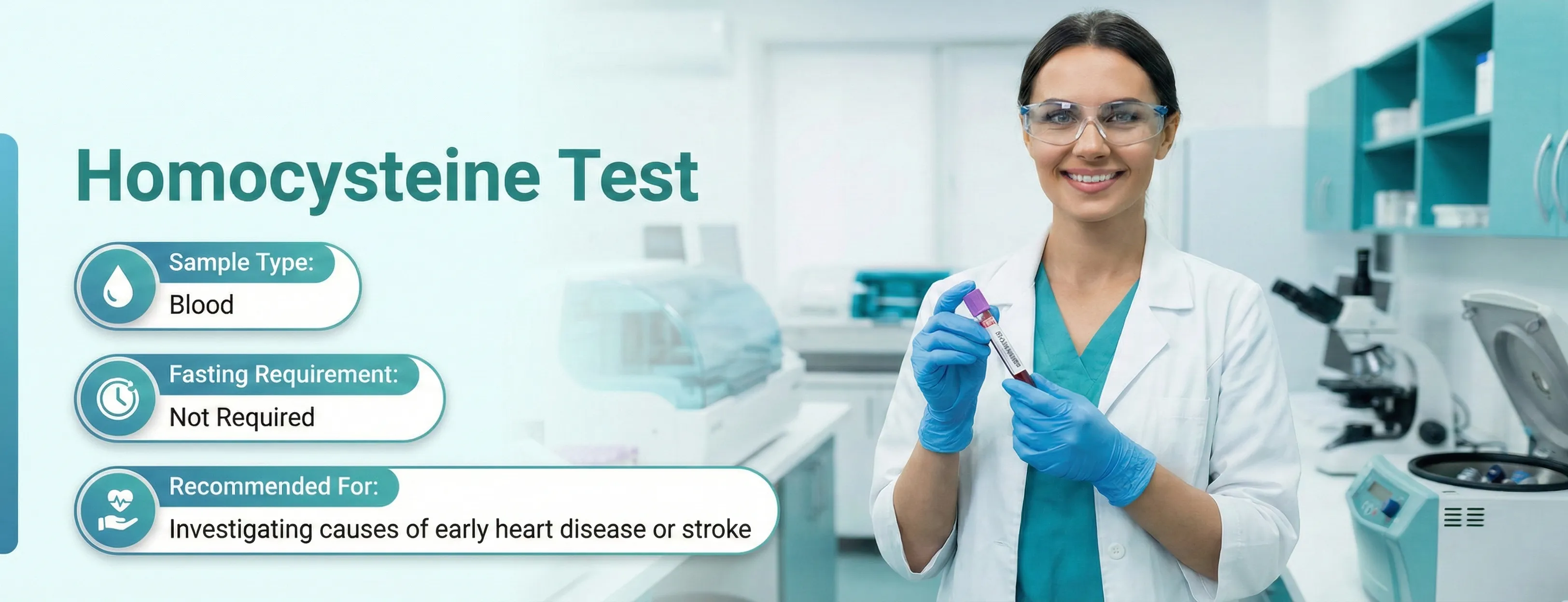410+ orders placed in your location
100% NABL & ISO Certified Lab • 100% Accurate Reports
Homocysteine Test
Plasma Total Homocysteine Test, Total Homocysteine Test, HCY SP Test
- SummaryThe Homocysteine test measures the level of homocysteine in the blood, an amino acid linked to a higher risk of heart disease, stroke, cognitive decline and vitamin B deficiencies. Elevated levels may indicate a deficiency in B6, B12, or folate. The test is done using a blood sample, and fasting for 8–10 hours is recommended.Read more
- Reports Within14 HrsView Sample Report100% NABL & ISO Certified Labs
- SampleBlood
- AgeAll Age Group
- GenderMale and Female
- FastingNot Required
PharmEasy Promises
Know More About The Test
A quick info on Homocysteine Test
Overview
Homocysteine is an amino acid (a building block of the body) produced during protein breakdown. It is produced in small amounts in the blood. The primary sources of methionine like fisheries, meats and dairy products are converted into homocysteine. This conversion takes place through several compounds like vitamin B6, B12 and folic acid.
Homocysteine is typically low in the body, so elevated levels may indicate deficiencies of several vitamins. To rule out this vitamin deficiency, your doctor may prescribe you a blood homocysteine test, a test that examines levels of vitamin B6, vitamin B12 and vitamin B9 (folic acid). In some countries, the homocysteine test is a routine newborn screen test.
Some of the symptoms seen in vitamin deficiencies like dizziness, weakness, fatigue, increased heart rate, loss of appetite, paleness, sore tongue and mouth, tingling, numbness and burning in the feet, hands and arms can be signs of abnormal levels of homocysteine in the blood.
A high homocysteine level is also associated with some disease conditions like atherosclerosis, osteoporosis, heart attack, thyroid dysfunction, kidney disease, psoriasis and side effects of certain medications.
Moreover, high homocysteine levels can cause risk complications such as heart attacks, strokes, dementia and others if they aren't properly treated. Although, the high homocysteine condition may be more prevalent in some populations, such as alcoholics (due to their poor vitamin intake) or patients with chronic kidney disease.
The statistics indicate that between 5% and 12% of people have mildly elevated levels of homocysteine (hyperhomocysteinemia). The National Health and Nutrition Examination Survey (NHANES III) states that 92.85% of men (>11.4umol/L) and 81.60% of women (10.4umol/L) have high homocysteine levels in their blood.
Sample Type
The homocysteine test is performed on a blood sample. A 10-12 hour fasting blood sample requires taking accurate results of blood homocysteine level.
Risk Assessment
Homocystinuria, Vitamin deficiency, Cardiovascular diseases
What does this test detect?
The amylase test generally measures the amount of amylase in the blood.
Indications for Homocysteine Test
A low or high level of homocysteine in the blood can have symptoms correlated with a deficiency of some vitamins.
Some of the symptoms with increased levels of homocysteine in the blood are:
- Pale skin
- Weakness
- Dizziness
- Mood swings
- Mouth sores
- Burning or tingling sensation in the hands and legs
- Muscle weakness
- Pale or yellowish skin
- Depression
- Shortness of breath
- Irregular heartbeat
- Weight loss
- Mental confusion
- Stress
However, abnormal homocysteine levels in the blood always do not necessarily mean you have a medical condition. Some factors like aging, high alcohol consumption and being male can affect your homocysteine blood levels.
After a homocysteine blood test, if the higher levels indicate vitamin deficiency or heart disease, further management will be decided by the cardiologist. Regular testing every three months is required for monitoring and adjusting the dosage.
Drug medications like phenytoin, sulfasalazine and methotrexate are used to treat high levels of homocysteine in the blood.
How frequently should you take this test?
The homocysteine test measures the amount of homocysteine amino acid present in the blood. The test helps diagnose and monitor deficiencies of vitamins B6, B12 and folic acid. Also, this homocysteine blood test gives an idea about the heart-related problem or rare inherited disease.
Your doctor may recommend repeating the homocysteine blood test every three months if you have detected a high level of homocysteine in the blood. But, if no abnormal results are shown with the test, an annual testing recommendation will be recommended by your doctor.
Test Preparation
What to Expect During the Test
Before the Test
Before undergoing the Homocysteine test, it is important to fast for A to B hours beforehand. This fasting period is crucial for achieving accurate test results. Therefore, it is wise to seek advice from a doctor before taking any test to determine if there are any specific restrictions in place.
During the Test
A phlebotomist will draw blood from a vein in your arm for the sample. Your experience will likely involve:
- Disinfecting the site where the needle will be inserted with an antiseptic.
- Wrapping a tourniquet around your arm to make the veins more visible.
- Inserting a disposable needle into the vein to collect the blood. This process may cause minor discomfort from the needle and could take a few seconds.
- Placing the sample in a small container or test tube labelled with your test information.
After the Test
After the Blood is Collected:
- Applying a bandage to the site where the needle was inserted to prevent any bleeding.
- You may feel slightly sore or lightheaded, which is normal and nothing to be concerned about. You may be advised to rest for a few minutes.
- Contact your doctor if you experience any bleeding, discomfort, or rashes at the puncture site.
Parameters
This test measures the level of homocysteine in the blood.
The homocysteine test values give an idea about the decrease of homocysteine level or its higher levels in the blood. If the value is on the higher side or lower side, it indicates a disorder related to cardiovascular, blood clotting, stroke, osteoporosis and dementia, etc. Although, a low level of homocysteine is rare.
Ranges
The normal range of homocysteine in the blood is measured in micromoles per litre (μmol/L).
Normal range: 6.6-14.80 μmol/L
High levels of homocysteine are considered above 14.80 μmol/L and termed as a condition called hyperhomocysteinemia.
This condition is further classified into other ranges:
- Moderate hyperhomocysteinemia: 15 to 30 μmol/L
- Intermediate hyperhomocysteinemia: 30 to 100 μmol/L
- Severe hyperhomocysteinemia: more than 100 μmol/L
The normal values and reference ranges of the test may vary from lab to lab. Please refer to the ranges mentioned in the report and consult a doctor to understand the interpretation of lab reports.
Test Result Interpretation
Increased or decreased levels of homocysteine in the blood can cause several medical conditions.
High levels of homocysteine are indicators of these diseased conditions:
- Osteoporosis: Excess homocysteine level in the blood can generate a diseased condition in which bones get weaker or thinner than usual and lead to mild to severe pain in joints and bones.
- Thrombosis: A condition in which blood clots form in arteries due to excessive homocysteine levels and other factors in the blood.
- Venous thrombosis: A condition in which blood clots deposit in the venous vessels of the body as a result of high homocysteine levels.
- Heart attack: With an excess of homocysteine levels and clotting in blood vessels, the blood flow to the heart can be restricted, resulting in heart attacks or strokes.
- Dementia: It is a term used to determine a medical condition in which a person has impaired ability to remember, think and disturb their daily life. If the homocysteine level remains elevated irrespective of treatment, then it can lead to dementia.
- Alzheimer's disease: A dementia condition that impairs memory and mental functions of the individual.
Low levels of homocysteine:
There are some rare cases of low levels of homocysteine in the blood. Low homocysteine has been associated with peripheral neuropathy (weakness, pain from nerve damage, usually in hands and feet).
Price/Cost
Depending on the city and the lab, the cost of a Homocysteine test can differ. Generally, the price for a Homocysteine test ranges from INR 639 to INR 1139. Here's a detailed breakdown of the average expenses for a Homocysteine test in several key cities in India:
City | Min Price | Average Price | Max Price |
Homocysteine Test Price in Bengaluru | 639 | 889 | 1139 |
Homocysteine Test Price in Chennai | 639 | 889 | 1139 |
Homocysteine Test Price in Delhi | 639 | 889 | 1139 |
Homocysteine Test Price in Hyderabad | 639 | 889 | 1139 |
Homocysteine Test Price in Kolkata | 639 | 889 | 1139 |
Homocysteine Test Price in Lucknow | 639 | 889 | 1139 |
Homocysteine Test Price in Mumbai | 639 | 889 | 1139 |
Homocysteine Test Price in Nagpur | 639 | 889 | 1139 |
Homocysteine Test Price in Patna | 639 | 889 | 1139 |
Homocysteine Test Price in Pune | 639 | 889 | 1139 |
Risks and Limitations
The Homocysteine blood test is a common blood test with a very low risk of complications. Seek medical advice right away if you notice-
- Excessive bleeding following the needle insertion.
- Discomfort or swelling at the insertion site.
Limitations of the test
- Negative impact on the outcome of the test due to equipment or human errors.
- Wrong understanding of the markers.
Was This Test Information Helpful?
Please rate your experience
References
Health packages containing 'Homocysteine Test'
People Also Ask
What does it mean when your homocysteine is high?
What are the normal homocysteine levels in blood?
What causes high homocysteine levels in blood?
How can I lower my homocysteine levels naturally?
Does exercise lower homocysteine?
Have any doubts? Ask us.
Ask us anything about the Homocysteine Test to understand it better
We provide trusted, expert-curated health content to support better awareness,prevention, and care.
Backed by experienced doctors, medical experts, and strict editorial standards.


